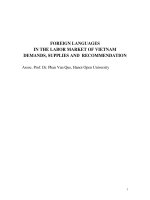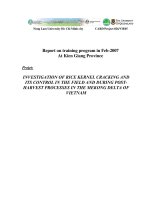In the FB sector of Vietnam, Highlands Coffee is wellknown as a signature brand combining traditional coffee beans and modern drinking styles for customers
Bạn đang xem bản rút gọn của tài liệu. Xem và tải ngay bản đầy đủ của tài liệu tại đây (90.17 KB, 4 trang )
Table of Contents
I.
Introduction....................................................................................................................1
II.
Literature Review............................................................................................................1
2.1.
The decision-making process in buying the product.............................................................1
2.2.
Analyze some factors influencing the target markets' buying decision..................................1
2.3.
Explain the role of brands in the decision-making process...................................................2
III.
Applied consumer behaviour theories..........................................................................2
3.1.
Identification of Highlands Coffee’s applied consumer behaviour theories..........................2
3.2.
Evaluate success of Highlands Coffee marketing and recommendation...............................3
IV.
Conclusion..................................................................................................................3
References..............................................................................................................................3
I.
Introduction
In the F&B sector of Vietnam, Highlands Coffee is well-known as a signature brand combining
traditional coffee beans and modern drinking styles for customers. Highlands Coffee's target
demographic consists of middle-class consumers, office employees, and young individuals.. In
this paper, the marketing strategy of Highlands Coffee in Hanoi based on theories of customer
behaviour theories will be analyzed in detail.
II.
Literature Review
II.1.
The decision-making process in buying the product
The consumer purchasing decision process comprises five stages: issue detection, information
search, alternative assessment, purchase choice, and post-purchase (Karimi et al., 2018).
However, depending on the personalities of different customer groups, they may change the
process. As both intrinsic and extrinsic factors can establish customers' needs, marketers must be
capable of identifying all conditions and circumstances evoking target customers' needs.
Furthermore, focusing on products' existing attributes is critical for marketers to better satisfy
customers' expectations, as brand trust is affected by buying decisions.
II.2.
Analyze some factors influencing the target markets' buying decision
There are many different factors with different patterns influencing the buying decision. Firstly,
product quality is considered a leading influential factor in customers' purchase decisions. Only
quality products will meet user needs, be in line with new trends, leave an impression in
customers' hearts, and make them remember brands immediately when in need. Product quality
is often reflected in designs, patterns, colours and the ability to satisfy customer needs (Deepak
& Jeyakumar, 2019). Secondly, businesses must also provide professional customer care service
to consumers to help customers care about the product and be willing to refer more new
customers. Thirdly, discounts and promotions also influence consumers' purchasing decisions
noticeably. Businesses can apply different forms of deals and promotions such as buy 1 get 1
free or preferential policies with loyal customers (Rana & Paul, 2020).
II.3.
Explain the role of brands in the decision-making process
Another influential factor in consumers' purchasing decisions is brand awareness. Some
consumers are often afraid of a new brand and usually choose products from a well-known or
familiar brand. Especially in the era of technology 4.0, when online shopping becomes popular,
brand awareness strongly impacts purchasing behaviour (Prentice et al., 2019). Modern
customers, especially middle-class consumers, office workers, and young people, know which
brands satisfy their needs and which do not. As a result, branding becomes a tool to simplify the
customer's purchasing decision quickly. This allows customers to reduce the cost of time and
effort searching for products (Chang et al., 2018).
III.
Applied consumer behaviour theories
III.1.
Identification of Highlands Coffee’s applied consumer behaviour
theories
Being fully aware of the needs of target customers who need to enjoy delicious, branded drinks
and modern spaces, Highlands Coffee always focuses on creating an atmosphere to enjoy coffee
for customers. Coming to Highlands Coffee, customers can sit in the cosy room of the cafe
sipping a cup of coffee, enjoy the relaxed atmosphere, read a few pages of books and newspapers
and listen to deep and relaxing music that flees the fatigue, stress, or anxiety, worry behind. With
entrepreneurs doing business, and negotiating contracts with partners, sometimes to achieve their
expectations, Highlands is a good place. Highlands is widely recognized as the top leading place
for the youth's meeting, chatting and dating.
The product is key to the Highlands Coffee brand's positioning. As a result, Highlands Coffee's
marketing approach divides its goods into two categories: drinks and food. Café with Cafe Phin
Sua Da as the main product, Tea with the Golden Lotus Tea product line as the main product,
and Freeze with Freeze Green Tea as the primary development representing each group is always
prioritized because these are the three "best sellers" products that bring Highlands the most
revenue (Nguyen, 2020). Furthermore, when it comes to the brand, three primary groups with
three important goods have addressed all consumers' demands. Speaking of food, there are two
main lines, including bread and cakes, as bread is a familiar dish, the "national soul of the
nation" of Vietnam. In addition, in the marketing strategy of Highlands Coffee, there are also
additional product lines, such as packaged and canned products, to reach customers far away.
Highlands Coffee's goods are offered at a fairly broad price range, ranging from 30,000 to
60,000 VND, in order to promote the brand to a wide spectrum of consumers (Nguyen, 2020). In
addition, Highlands also pays great attention to attractive promotions such as buy one get one
free or free upsize on special holidays of the year and purchase combos with excellent
promotions. Furthermore, Highlands Coffee also adopts a loyalty program to award engaged
customers with VIP cards, membership offers, etc.
III.2.
Evaluation of the Highlands Coffee's marketing success and
recommendation
Highlands Coffee's marketing strategy has helped this brand make breakthroughs in the domestic
and international markets, becoming one of “the leading coffee brands for business” and "coffee
for high-income intellectuals". However, after the Covid-19 pandemic, Highland, in the coming
years, may face more significant challenges from strong domestic and international brands such
as Phuc Long, Trung Nguyen, Starbucks, etc. (Tien et al., n.d). Therefore, it is recommended that
Highlands continuously review and adjust its product and pricing strategy to expand the market
and reach affordable customers more effectively. In addition, Highlands should focus more on
CSR to better engage customers, such as launching fashionable water bottles and cups to attract
young people and encourage them to bring cups to reduce waste into the environment (MAI et
al., 2022).
IV.
Conclusion
In a nutshell, an intensive understanding of customer behaviour theories would benefit marketing
to make brands approach their target customers more effectively. However, it is recommended
that Highlands align its customer behaviour knowledge to the market trends for proper marketing
campaign design and implementation.
References
Chang, Y., Wang, X. and Arnett, D.B. (2018) “Enhancing firm performance: The Role of Brand
Orientation in business-to-business marketing,” Industrial Marketing Management, 72, pp. 17–
25. Available at: />Deepak, R. K. A., & Jeyakumar, S. (2019). Marketing management. Educreation Publishing.
Karimi, S., Holland, C.P. and Papamichail, K.N. (2018) “The impact of consumer archetypes on
online purchase decision-making processes and outcomes: A behavioural process perspective,”
Journal of Business Research, 91, pp. 71–82. Available at:
/>MAI, T. C. T., NGUYEN, H. S., PHAN, N. N. D., LE, M. H., LUU, P. K., NGUYEN, T. T. T.,
& NGUYEN, T. T. T. (2022). Impacts of Corporate Social Responsibility and Authenticity on
Brand Loyalty: Evidence from the Chain Coffee Shop Industry in Vietnam. The Journal of Asian
Finance, Economics and Business, 9(6), 159-173.
Nguyen, H. C. (2020). A study on customer behaviors in chain coffee shops in Vietnam (Doctoral
dissertation).
Prentice, C. et al. (2019) “The influence of identity-driven customer engagement on purchase
intention,” Journal of Retailing and Consumer Services, 47, pp. 339–347. Available at:
/>
Rana, J. and Paul, J. (2020) “Health motive and the purchase of Organic Food: A meta‐analytic
review,” International Journal of Consumer Studies, 44(2), pp. 162–171. Available at:
/>Tien, N. H., Jose, R. J. S., Mai, N. P., Van Thoi, B., & Van Hai, T. Analysis of Starbucks’ entry
strategy into Vietnam market.









